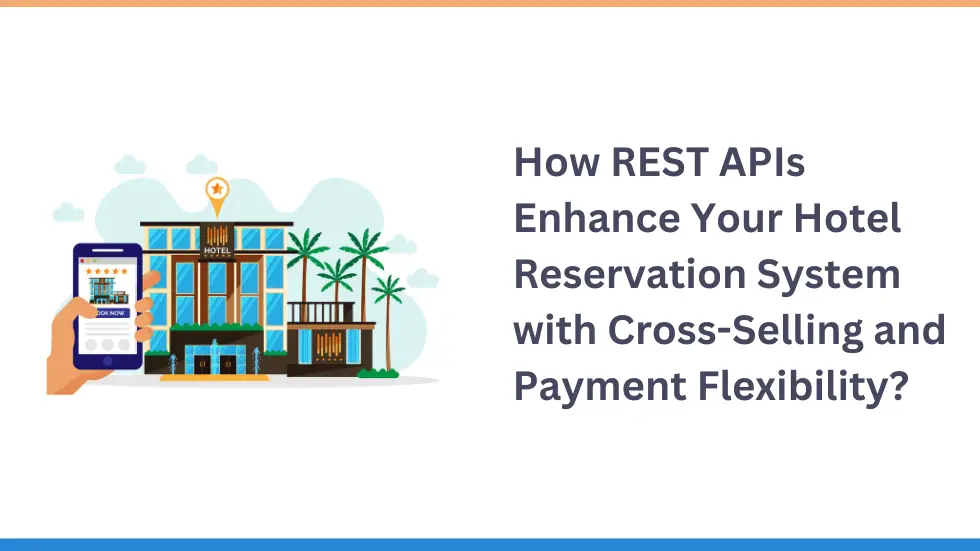In the modern hospitality industry, having a basic hotel reservation system is no longer enough. Guests now expect seamless digital experiences, personalized offers, and multiple payment options.
For hoteliers aiming to maximize revenue and improve guest satisfaction, integrating cross-selling capabilities and multi-payment gateway support is a strategic imperative.
This blog explores how enterprises can use REST APIs to upgrade their hotel reservation software — transforming it into a scalable, intelligent, and guest-centric system.
Why REST APIs are Essential for a Modern Hotel Reservation System
A well-structured hotel reservation system powered by REST APIs forms the backbone of efficient hotel operations. The core API should support:
- Room Availability Checks – Based on check-in/check-out dates, room type, and guest count
- Room Details Retrieval – Including images, pricing, and amenities
- Reservation Creation & Management – Enabling booking, cancellation, and modification
- Booking Summary Access – For post-reservation tracking and confirmation
These foundational endpoints create a flexible base, making it easier to integrate additional services like cross-selling features and multi-payment gateways without disrupting the core system.
Adding Cross-Selling to Hotel Booking Systems
Cross-selling enhances the guest journey while increasing average revenue per booking. Whether it’s a spa treatment, romantic dinner, or airport transfer, suggesting relevant services during the booking flow adds value — and REST APIs make this seamless.
🏗 Architecture for Cross-Selling Integration
Option 1: API Extensions for Recommendations
http
CopyEdit
GET /reservations/recommendations?roomTypeId=101&stayLength=3
Use dynamic parameters such as stay duration, room type, and number of guests to fetch personalized upsell offers.
Option 2: Microservice for Cross-Selling
A standalone microservice with its own REST API can manage all cross-sell logic. This keeps the system modular and scalable.
🚀 Use Cases
- Room Selection Stage: Offer upgrades or packages tailored to the chosen room.
- Checkout Page: Suggest early check-in, late check-out, or activity bookings.
- Post-Booking Communication: Use APIs for email or app notifications to suggest add-ons.
✅ Design Considerations
- Relevance: Recommendations must align with booking context
- Transparency: Clearly state offer details and pricing
- Flexibility: Easily update promotions based on seasonality
- Performance: Fast response times are critical to avoid checkout drop-offs
Integrating Multiple Payment Gateways for a Global Guest Base
A global hotel reservation system must support diverse payment methods — credit/debit cards, e-wallets, UPI, or even split payments. Failure to offer a guest’s preferred payment method may lead to lost bookings.
🏗 Integration Architecture
Option 1: Payment Orchestration Layer
This acts as a middleware between the hotel system and different payment providers. It offers a consistent API for handling:
- Payment method listing (/payments/methods)
- Payment initiation (/payments/initiate)
- Refunds and reversals
Option 2: Direct Integration (Not Scalable)
While direct gateway integration is possible, it results in tight coupling, complex logic, and higher maintenance.
🚀 Use Cases
- At Checkout: Display dynamic payment options via API
- Payment Processing: Route transaction to the correct gateway
- Confirmation & Refunds: Update booking system based on payment outcome
✅ Key Design Priorities
- Security: Use tokenization, encryption, and PCI DSS compliance
- Abstraction: Hide individual gateway complexities behind a unified API
- Resilience: Graceful failure handling and fallback logic
- Compliance: Align with global data protection and payment laws
Recommended Technology Stack
- Backend Frameworks: Node.js, Spring Boot, Django, ASP.NET Core
- API Tools: Swagger/OpenAPI for documentation
- Databases: PostgreSQL, MySQL, MongoDB
- Payment SDKs: Stripe, Razorpay, PayPal, Adyen, Authorize.Net
Key Benefits of REST API-Based Hotel Booking Software
✅ Scalability – Add features without disrupting operations
✅ Modularity – Maintain separate services for bookings, payments, and offers
✅ Faster Time to Market – Reuse endpoints for rapid development
✅ Improved Guest Experience – Personalization leads to better retention
✅ Future-Ready – Easy to integrate AI, loyalty programs, or third-party tools
Final Thoughts
Building a modern, flexible hotel reservation system is critical to staying competitive in today’s hospitality landscape.
By leveraging REST API integration, hoteliers can enrich the booking experience with personalized offers and flexible payment options — ultimately driving guest loyalty and business growth.
Whether you’re an established hospitality group or a startup building the next-gen travel platform, adopting API-driven architecture is a future-proof investment.
🚀 Partner with Experts in Hotel Software Development
At EmbarkingOnVoyage Digital Solutions, we specialize in building scalable, secure, and guest-friendly hotel reservation systems. From cross-selling engines to multi-gateway payment orchestration, our team helps you engineer smart solutions that grow with your business.
Let’s innovate your hotel tech stack — together.
Additional Resources:
